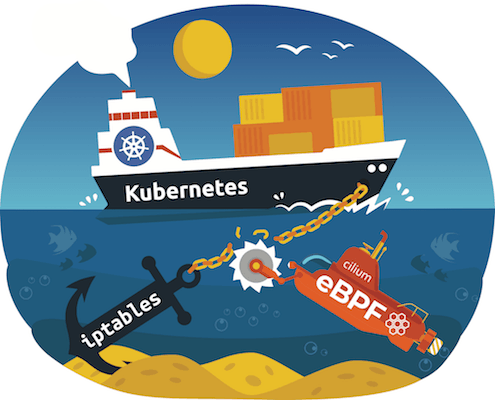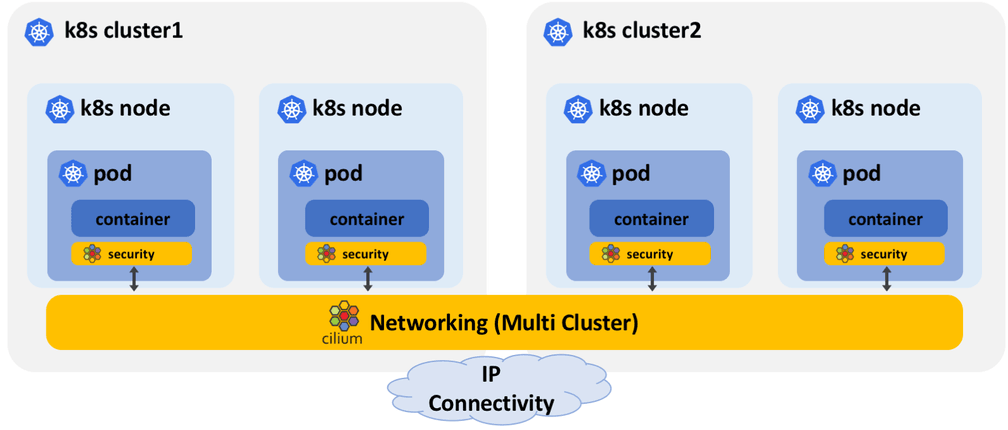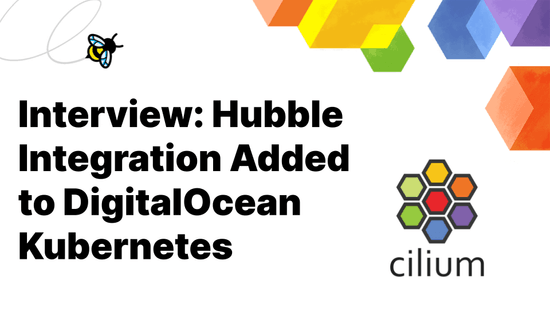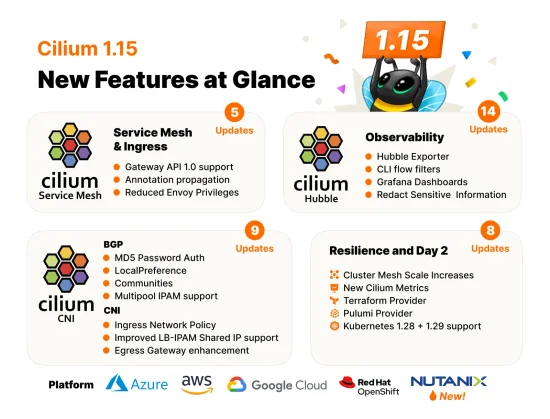Cilium 1.2: DNS Security Policies, EKS Support, ClusterMesh, kube-router integration, ...

We are excited to announce the Cilium 1.2 release. The release introduces several new features addressing the top asks from Cilium users and community members. One of the most exciting features is the introduction of security policies based on DNS names to secure access to external services outside of the cluster. Another top ask was to introduce the ability to connect and secure multiple Kubernetes clusters. We are introducing ClusterMesh as an alpha level feature to address this ask. It allows to connect and secure pods running in different Kubernetes clusters. Equally important is the Kube-router integration with Cilium. The effort led by the team from DigitalOcean enables to combine BGP networking provided by kube-router with BPF based security and load-balancing from Cilium. As usual, a big shout out to the entire community of Cilium developers. The total number of contributors has grown to 85 and 579 commits have been contributed in the time period between 1.1 and 1.2.
What is Cilium?
Cilium is open source software for transparently providing and securing the network and API connectivity between application services deployed using Linux container management platforms like Kubernetes, Docker, and Mesos.
At the foundation of Cilium is a new Linux kernel technology called BPF, which enables the dynamic insertion of powerful security, visibility, and networking control logic within Linux itself. Besides providing traditional network level security, the flexibility of BPF enables security on API and process level to secure communication within a container or pod. Because BPF runs inside the Linux kernel, Cilium security policies can be applied and updated without any changes to the application code or container configuration.
See the section Introduction to Cilium for a more detailed general introduction to Cilium.
1.2 Release Highlights
- DNS/FQDN based security policies
- Define network security rules based on FQDN/DNS names to express allowed connectivity to external services, e.g. allow to foo.com. (Beta)
- AWS EKS Support
- New integrated etcd operator tailored to managed Kubernetes to remove the dependency on requiring an external kvstore. (Beta)
- Clustermesh (Inter-cluster connectivity)
- Pod to pod networking across multiple Kubernetes clusters (Alpha)
- Label based network security policy enforcement across clusters, e.g. allow pod foo in cluster1 to talk to pod bar in cluster2 (Alpha)
- Kube-router integration for BGP support
- Co-operative mode to run alongside kube-router to enable BGP networking
- KVstore based Node Discovery
- Enables automatic node discovery on non-Kubernetes environments
- Load balancing
- Support for consistent backend selection as service backends scale
- Support for service label/name based policy in combination with L4 rules
- Efficiency & Scale
- Increased security identity space from 16 to 24 bits for large and multi cluster scale environments
- First implementation of BPF based datapath notification aggregation
- Continued progress on more efficient CPU utilization
- Automatically detect MTU of underlying network
- Use of local service ID allocation when DSR is disabled for improved load balancing scalability
- Documentation
- New AWS EKS installation guide
- Reference to kubespray installation guide
- New simplified installation and upgrade instructions
DNS Based Security Policies
Services running in a Kubernetes cluster often interact with a range of services that are external to the cluster. Common examples include SaaS services such as S3, RDS, DynamoDB, etc., API based services such as Google maps, Salesforce APIs, Twilio, etc. or self-hosted services such as Oracle database clusters, Windows based applications, etc. Until now, Cilium supported CIDR based policies for interacting with such external services. However, CIDR based policies are difficult to define and maintain since the IP-addresses for the services can change frequently. Cilium 1.2 now supports specifying policies based on DNS names. The current implementation supports the core use case of white-listing external services based on their FQDNs. Considering the complexities around DNS resolutions (e.g. TTLs, CNAMEs, etc. ) and associated policy requirements (e.g. wildcard based specification such as *.google.com), there is more work coming in subsequent releases for comprehensive DNS based policies.
Example: Allow to my-remote-service.com
The following simple example demonstrates how to define a network security policy that allows all pods with the label app=test-app to resolve DNS names via kube-dns and make external requests to the service my-remote-service.com:
apiVersion: "cilium.io/v2"
kind: CiliumNetworkPolicy
metadata:
name: "to-fqdn-example"
spec:
endpointSelector:
matchLabels:
app: test-app
egress:
- toFQDNs:
- matchName: "my-remote-service.com"
- toEndpoints:
- matchLabels:
"k8s:io.cilium.k8s.policy.serviceaccount": kube-dns
"k8s:io.kubernetes.pod.namespace": kube-system
"k8s:k8s-app": kube-dns
toPorts:
- ports:
- port: "53"
protocol: UDPCilium will automatically maintain the respective CIDR based rules to allow all pods to talk to all IP addresses that are being returned for that DNS name.
AWS EKS Support
Follow the new guide Installation on AWS EKS using etcd operator to install Cilium on AWS EKS managed Kubernetes clusters.
The installation guide features the brand new integrated etcd operator for Cilium to manage its own etcd cluster. Cilium requires a key-value store such as etcd to store security identities. In many cases the etcd used by Kubernetes isn’t accessible for use by Cilium. For example, in managed Kubernetes such as EKS, GKE, AKS, etc. there is limited access to the Kubernetes etcd service. In Cilium 1.2, we are using an etcd operator which will install and manage a highly available etcd cluster for use by Cilium. This will make the installation and use of Cilium much easier without any dependencies on Kubernetes etcd and without requiring an out-of-band management of etcd clusters.
We are actively working on AKS integration and guides on how to run on GKE will be published in the next couple of weeks. Talk to us on Slack if you have questions or need help.
ClusterMesh: Networking and Security across Multiple Kubernetes Clusters
Running multiple Kubernetes clusters is becoming common. Major use cases high availability of services running in different Availability Zones or Regions; point-of-presence services running in multiple clusters serving different geo-locations; organizational reasons such as separating PCI vs non-PCI compliant services; or simple separation of dev, test and prod workloads.
One of the fundamental requirements for multiple Kubernetes clusters is how to connect the services and how to establish east-west network security for the cross-cluster interactions. In Cilium 1.2, we are introducing the ability to connect pods in different clusters without requiring any ingress controllers or load balancers. Since pods are able to interact directly, Cilium is able to preserve their identity and enforce complete L3/L4 and L7 access controls for the east-west traffic.

Rather than using a single centralized etcd for all clusters, Cilium uses a decentralized approach for creating the cluster-mesh and establishing pod identities. In this approach, each cluster is able to independently manage identities for their pods. Each cluster is assigned a unique identifier, which also serves as an identity namespace. So the pod identity becomes a combination of cluster identity + pod identity. This approach is easy to manage and scale rather than coordinating the identities across all clusters. The approach also aligns well with the high-availability goals for multi-cluster deployments in that each cluster lifecycle is independent of others. Check out the multi-cluster install guide to try the Cilium cluster-mesh.
BGP Support: Kube-router + Cilium

Kube-router is a cloudnativelabs initiative to address a variety of Kubernetes networking requirements and deliver a unified solution. From a data-forwarding perspective, Kube-router uses BGP to broadcast and manage the routes for all pods in a cluster. Using BGP peering with external routers, Kube-router can make it easy to establish connectivity between Kubernetes pods and services running outside the cluster. Also, Kube-router advertises the cluster IP when service is created which means that a service can be accessed from outside the cluster using single cluster IP and standard ports.
As a result of the community effort led by the DigitalOcean team, Cilium is now integrated with Kube-router combining the benefits of BPF with BGP based routing.
Check out the guide Using kube-router to run BGP to learn how to run kube-router and Cilium side by side to run BGP networking with Cilium L3-L7 policy enforcement and load-balancing.
Istio 1.0 Support

Istio 1.0 was released recently. Cilium is already well integrated with Istio providing efficient data forwarding as well as L3/L4 and L7 security for servicemesh architectures. We have blogged about this in details in the post Istio 1.0: How Cilium enhances Istio with socket-aware BPF programs. Cilium 1.2 includes several improvements in the integration with Istio 1.0.
Scalability & Efficiency
As usual, a large effort continues for improving the already good scalability and becoming more CPU efficient by extensively profiling Cilium in various environment and by optimizing the operation of connection tracking and other crucial data structures. Ping us on Slack if you would like to learn more.
Upgrade Instructions
As usual, follow the upgrade guide to upgrade your Cilium deployment. Feel free to ping us on Slack.
Release
- Container image:
docker.io/cilium/cilium:v1.2.0


